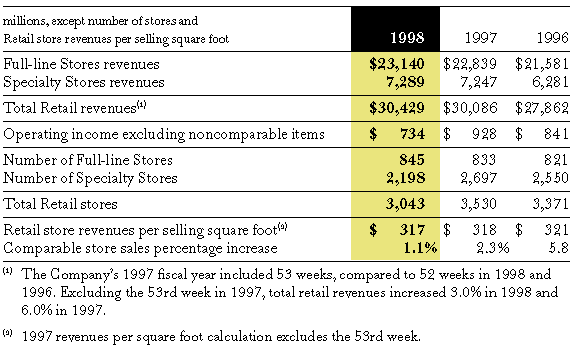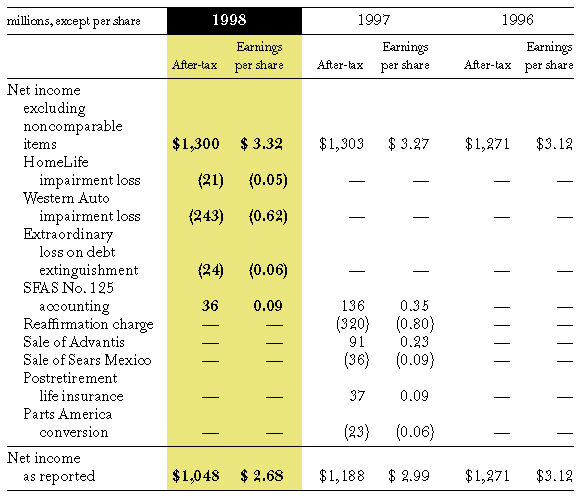 |
| Sears, Roebuck and Co. and its consolidated subsidiaries ("the
Company") is a multi-line retailer providing a wide array of merchandise
and services in the United States, Puerto Rico and Canada. Operating
results for the Company are reported for four domestic segments and one
international segment. The domestic segments include the Company's
operations in the United States and Puerto Rico.
The Company's segments are defined as follows: Retail - consisting of:
Corporate - includes activities that are of an overall holding company nature, primarily consisting of administrative activities, the costs of which are not allocated to the Company's businesses. International - consisting of retail, services, credit and corporate operations similar to the Company's domestic operations. International operations are conducted in Canada through Sears Canada Inc. ("Sears Canada"), a majority owned subsidiary. International operations were also conducted through Sears Roebuck de Mexico, S.A. de C.V. ("Sears Mexico"), a 75.5% owned subsidiary until March 1997, when the Company sold 60% of the outstanding shares of Sears Mexico to Grupo Carso S.A. de C.V. Thereafter, Sears Mexico's results are no longer included in the Company's consolidated operations. Throughout management's analysis of consolidated operations and financial condition, certain prior year information has been reclassified to conform with the current year presentation. All references to earnings per share relate to diluted earnings per common share. RESULTS OF OPERATIONS Consolidated Description of Noncomparable Items On November 2, 1998, the Company completed an Agreement and Plan of Merger of Western Auto, a wholly-owned subsidiary, and Advance Auto Parts whereby Sears exchanged its interest in Western Auto for $175 million in cash and approximately 40% equity ownership interest in the resulting combined company. Based upon the terms of the sale, the Company recorded a pretax charge of $296 million ($225 million after-tax) in the third quarter of 1998 to adjust the carrying value of Western Auto's assets to their estimated fair market value, less cost to sell. In the fourth quarter, the loss was revised to reflect an additional after-tax charge of $18 million based on the final terms of the transaction. On October 2, 1998, the Company prepaid debt with a face value of $300 million, which was due in May 2000. The transaction generated an extraordinary loss of $37 million ($24 million after-tax). The loss resulted primarily from the write-off of the related unamortized discount. In 1997, the Company implemented Statement of Financial Accounting Standards ("SFAS") No. 125 which changed the way the Company accounts for securitizations. SFAS No. 125 accounting provided incremental net income of $36 million in 1998 and reduced reported credit revenues, selling and administrative expense and the provision for uncollectible accounts by $549 million, $129 million and $478 million, respectively. In 1997, SFAS No. 125 accounting provided incremental net income of $136 million and reduced reported credit revenues, selling and administrative expense and the provision for uncollectible accounts by $321 million, $126 million and $417 million, respectively. The 1997 reaffirmation charge of $475 million ($320 million after-tax) represents the estimated cost of the settlement of lawsuits and investigations by governmental agencies, including federal prosecutors, which alleged that the Company had violated the United States Bankruptcy Code and consumer protection laws in various states through activities related to certain debt reaffirmation agreements and other related matters. This estimate was based on management's assumptions as to the ultimate outcome of future events and uncertainties. While at year-end 1998 there are still additional costs to be incurred related to these matters, one of the most significant uncertainties was resolved on February 19, 1999, when the Company's plea agreement with the U.S. Attorney for the District of Massachusetts was approved by a federal district court. As part of the agreement, the Company agreed to pay a $60 million fine. In 1997, the Company sold to IBM its 30% equity interest in Advantis, a joint venture between IBM and the Company. The sale resulted in a pretax gain of $150 million ($91 million after-tax) recorded in other income. In 1997, the Company sold 60% of the outstanding shares of Sears Mexico to Grupo Carso S.A. de C.V. The sale was recorded in the first quarter of 1997 and resulted in a pretax loss of $21 million reflected in other income and tax expense of $15 million, for an after-tax loss of $36 million. The Company changed its postretirement life insurance benefit plan in 1997 by eliminating retiree life insurance benefits for all active associates not retired by December 31, 1997. This plan change resulted in a one-time pretax curtailment gain of $61 million ($37 million after-tax) recorded as a reduction of selling and administrative expense. The majority of the Western Auto stores were converted to the Parts America format in 1997 and, as a result, the Company recorded a pretax charge of $38 million ($23 million after-tax) for this initiative. Analysis of Consolidated Results Excluding Noncomparable
Items In 1997, net income excluding noncomparable items was $1.30 billion or $3.27 per share, an increase of 4.8% over comparable 1996 per share earnings of $3.12. The improved profitability of the Retail and Services segments, coupled with strong Sears Canada performance, was largely offset by a decline in Credit results due to an increase in the domestic provision for uncollectible accounts, reflecting the trend of increased delinquencies and charge-offs during 1997. Reportable Segments |

| Retail Retail store revenues as reported, operating income excluding noncomparable items and related information are as follows: 
Retail revenues increased 1.1% in 1998 to $30.43 billion from $30.09 billion in 1997. Revenues in 1998 included 52 weeks compared to 53 weeks in 1997. Full-line Stores revenues increased 1.3% in 1998, benefiting from the net addition of 12 Full-line Stores as 23 stores were opened and 11 were closed. The Full-line Stores increase was led by solid revenue performance in hardlines merchandise as comparable store sales increased in 1998. Hardlines revenue increases in home appliances and electronics were partially offset by a decline in home improvement and home office merchandise sales. The hardlines revenue increase was partially offset by soft apparel sales. Apparel sales were strong in women's special sizes, fine jewelry and cosmetics and fragrances but weak in dresses, junior's, boy's and men's apparel. |
Annual Report Contents | Previous | Next | |
